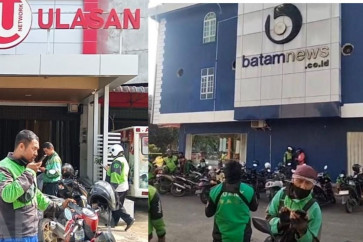Popular Reads
Top Results
Can't find what you're looking for?
View all search resultsPopular Reads
Top Results
Can't find what you're looking for?
View all search resultsPositive trend in Indonesia’s foreign reserves
The government’s external debt still dominates Indonesia’s FX reserves and adequate reserves management becomes crucial.
Change text size
Gift Premium Articles
to Anyone
D
espite multiple pressures on the macroeconomic environment due to the COVID pandemic -19, Bank Indonesia (BI) has for the past four successive months boosted the level of Indonesia’s foreign reserves to US$138.8 billion as of late February, enough for financing 10 months of imports and the government’s external debt. This level is higher than the international benchmark of three months of imports.
Reserve adequacy is consequential for the robustness of a domestic economy. One of the international reserves’ roles is to temporarily finance the balance of payment deficits. A growth trend in a country’s reserves shows it has a stronger buffer to maintain a sustainable external balance. Today, Indonesia manages a surplus trend of its trade balance, but maintaining greater reserves would improve domestic resiliency in anticipating sudden macroeconomic shifts.
Amid the ongoing pandemic, the robustness of international reserves is also important to sustain confidence in both the domestic currency and the economic standpoint. In the event of market shocks, reserves could contribute to moderating exchange rate volatility.
But in Indonesia’s case, the needs for spot market intervention are relatively reduced as BI directs currency stabilization via domestic non-deliverable forward (DNDF), a derivative of foreign exchange (FX). By doing so, BI effectively routes US dollar demand to longer maturities. This helps BI manage an optimum number of FX reserves.
BI as the monetary authority is given the mandate to manage Indonesia’s official foreign reserves, according to Article 13 of the BI Law. Not only that, it is important to maintain its adequacy and attain an optimal value of FX reserves because of the escalated challenges of macro dynamics. As a result, the government’s external debt still dominates Indonesia’s FX reserves and adequate reserves management becomes crucial.
But the number speaks for itself. Central Banking Publications has recognized BI as reserves manager of the year. The achievement was not a walk in the park. Top-notch reserves management requires a fluency in complex and diverse global financial markets and the resilient institutional arrangement of FX reserves.
On a side note, the economics of financial assets always involve the cost of holding ones (such as the cost of funds). As the reserves increase, there is also an escalated interest for BI to acquire higher return differentials and correspondingly preserve them. This adds another rationale as to why it is necessary to strengthen the diversification of BI’s reserves portfolio. In addition to compensating the alpha risk in finance (i.e., the risk vis-à-vis individual stock performance), there should be sufficient room to gain more returns.
BI is required to strike a balance between returns and risks. There is a need to enhance returns but at the same time, the risk must be acceptable for the adequacy scenario. The potential arbitrage is anticipated with thorough investment guidelines and a prudent decision-making processes. BI determines and applies strategic asset allocation through which the composition of the financial assets must be consistent with the objective and institution’s risk appetite in optimizing FX reserves.
The other balancing effort is by channeling the portfolio through two tranches. First, there is the liquidity trance in which the pool of assets is formed to finance short-term international liabilities and to support monetary policy. Second, there is the investment tranche that focuses on enhancing returns and a longer horizon.
Aside from portfolio diversification, one must also anticipate the beta risks in finance (i.e., the risk vis-à-vis the market as a whole). The precarious shift of macro dynamics could affect the domestic and external imbalances, which in turn, could drive the country’s risk premium up and may impact the position of FX reserves.
A real example that would potentially disrupt the external balance is the so-called “taper tantrum” as one of United States President Joe Biden’s mega stimulus negative consequences (i.e., the risk of capital flows). Although it might not be seen shortly, it must be accounted for as early as possible. To deal with this type of beta risk, the answer is structural, such as financial reform and the ease of doing business.
FX reserves are a crucial monetary indicator for the country’s external resilience and are directly related to the currency exposures on the monetary policy side. Going forward, the level of FX reserves must consistently be optimized and the steady upward curve should be maintained.
The yet-unsolved pandemic might drive the task of managing reserves a tough row to hoe, but it is not impossible. Along the journey, Indonesia proved it is not only doable but even made some improvements.
The fundamentals of Indonesia’s FX reserves should be supported by the real sector economy, including the enhancement of export performance. Capital inflows must be deflected from mere “hot money” toward more export-oriented industries through foreign direct investment. By doing so, productivity would also raise and hence could supporting further economic recovery while ensuring a more sustainable economy.
The optimum amount of FX reserves is an advantage; the rest of it is to make use of that advantage to move forward and get better each day.
***
The writer is a legal affairs staffer at Bank Indonesia. The views expressed are personal.










